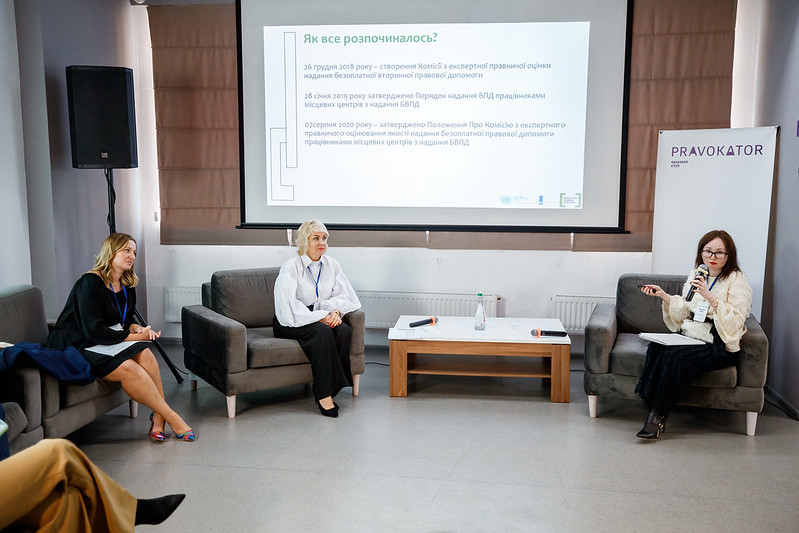UNDP-supported forum seeks to improve quality of legal assistance in Ukraine
Photo credit: Andrii Kriepkikh / UNDP in Ukraine
Kyiv, 14 September 2021 – For those who can not afford legal representation, navigating the justice system without a lawyer can be nearly impossible for people facing civil legal challenges, such as unlawful evictions, foreclosure, domestic abuse, or wrongful denial of government assistance. For this reason, free legal aid is a vital service in the functioning of a modern state that seeks to leave no one behind.
The United Nations Development Programme (UNDP), together with the Coordination Centre of Legal Aid, are exploring ways to further develop the Ukraine’s free legal aid system at two-day legal forum taking place in Kyiv on 14-15 September 2021. The discussions are centered on new report, ‘Development and Implementation of the Peer-to-Peer Quality Evaluation within the National System of Free Legal Aid Provision in Ukraine,’ prepared with the financial support of the governments of Denmark, Sweden and Switzerland.
The study introduces the principle of ‘peer review’ in the system of free legal aid. According to the principle, all the work of free legal aid lawyers should be evaluated by a network of other lawyers who are not directly acquainted with them, using approved quality standards. Through this approach, it is believed the quality of free legal services will increase significantly and reach even more citizens who find themselves in need of urgent support. This is especially important for those citizens who suffer from the ongoing armed conflict in eastern Ukraine.
UNDP Deputy Resident Representative in Ukraine, Manal Fouani, said her organization is doing its utmost to ensure that all Ukrainians, especially the most vulnerable living in the conflict-affected communities in eastern Ukraine, have access to high-quality legal assistance. “Unfortunately, the long-lasting armed conflict in eastern Ukraine and the COVID-19 pandemic continue to increase difficulties for vulnerable Ukrainians,” Fouani said. “We are convinced this unique approach will help the free legal aid system to transition to a qualitatively new level. Our joint discussions on the further development of professional quality control of free legal aid is equally important, as this is a necessary condition for the coordinated operation of this system and the provision of quality services.”
Deputy Minister of Justice of Ukraine, Valeria Kolomiets, said improving the quality of legal aid is one of the main priorities for the Ministry of Justice. “In essence, ‘peer review’ is a model in which independent, experienced experts assess the quality of work of other professionals based on certain criteria,” she said. “When it comes to free legal aid, lawyers check on each other using approved quality standards. The initial stages of implementation of this mechanism have shown that it works in raising the bar.”
The study references the best practices in free legal aid from Australia, Belgium, Canada, Scotland, New Zealand, the Netherlands and Ireland and, more importantly, proposes a system for assessing the quality of free legal aid in Ukraine. This assessment system is to be piloted, with UNDP support, in the communities most affected by the armed conflict in eastern Ukraine. The pilot study will lay the grounds for further development and the implementation of professional quality assessment in the free legal aid system not only in the pilot regions, but also all across the country.
The Director of the Coordination Centre for Legal Aid a.i, Oleksandr Baranov, said the interests of a person dealing with a legal challenge are at the heart of the free legal aid system. “One of the most effective models for assessing the quality of free legal aid is the professional evaluation by peers, in which experts evaluate written consultations or materials of legal cases of their colleagues and determine whether they meet the quality criteria,” Baranov said. “This allows the system to improve the skills of lawyers working on specific issues by detecting any possible mistakes in the work they have performed. Through this careful peer-to-peer analysis, we can understand how to improve the process to provide legal assistance to our citizens most effectively.”
The Free Legal Aid Quality Assessment Forum is being organized under the UN Recovery and Peacebuilding Programme with the financial support of the Kingdom of the Netherlands.
Background
The United Nations Recovery and Peacebuilding Programme (UN RPP) is being implemented by four United Nations agencies: the United Nations Development Programme (UNDP), the UN Entity for Gender Equality and the Empowerment of Women (UN Women), the United Nations Population Fund (UNFPA) and the Food and Agriculture Organisation of the United Nations (FAO).
Twelve international partners support the Programme: the European Union (EU), the European Investment Bank (EIB), the U.S. Embassy in Ukraine, and the governments of Canada, Denmark, Germany, Japan, the Netherlands, Norway, Poland, Sweden and Switzerland.
Media enquiries
Maksym Kytsiuk, Communications Specialist, UN Recovery and Peacebuilding Programme, maksym.kytsiuk@undp.org, +380 63 576 1839


 Locations
Locations




